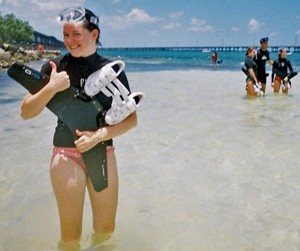
VIDEO: UC Students Test Dive Mechanical Dolphin Tails
Ten students from the University of Cincinnatis
interior design program recently returned from the Florida Keys where they tested and provided feedback to the inventor and manufacturer of unusual foot appendages that aid human sea divers to swim like dolphins.
Then, about 24 UC design students further tested these mechanical Flipper fins (called Lunocets) in UCs Olympic-sized lap pool.
The mechanical foot fins could be said to transform users into something like mermen and mermaids, according to Brian Davies, associate professor in UCs School of Architecture and Interior Design, who is leading the student testing of the products. He is doing so as part of an ongoing series of courses on design for extreme environments and as part of an experiment within UCs
College of Design, Architecture, Art, and Planning to link design students and classes to the needs of entrepreneurs.
Davies, along with UC design graduate students Jon Lowry and Ryan Rosensweig, will present on the Flipper" fin course, actually titled Retail Design: Lunocet Retail Launch, on
Aug. 3, 2010
, at the prestigious Industrial Designers Society of America conference in Portland, Ore.
MORE ABOUT THOSE FLIPPER FINS AND THE UC COURSE
According to
by National Geographic Adventure, the tails attachable to human feet for dolphin-kick swimming help users attain speeds twice as fast as the swiftest Olympic swimmer.

UC student Emily Craig.
They are the brainchild of inventor and manufacturer Ted Ciamillo, founder and president of Ciamillo Components, Inc., in Nicholson, Ga. Ciamillo successfully designs and manufactures light and powerful aluminum bicycle brakes. He is now fine tuning his offering of Lunocet fins and turned to UCs Davies because of Davies
extreme environments design courses
and to obtain informed feedback from design students.
Said Davies, So far, the students have made a number of suggestions regarding design and regarding the marketing of this product. Since the students doing the product testing in the Florida Keys had been working on designing retail experiences, they made suggestions related to product marketing that included marketing to cruise ships that would use the fins as an activity for passengers, suggestions for marketing via outdoor retailers and suggestions for marketing via the Web.
He added that many design courses link students to the needs of established corporations and non-profits. Few courses in design programs link experiential learning to the needs of entrepreneurs. This is an alternative future model for design training and experiential learning, Davies said, adding, It gave our students many of whom have real-world experience thanks to our required cooperative-education quarters insight into something they hadnt seen before: An entrepreneurial business where design, manufacturing and distribution are all housed under one roof. Theyve all worked at places where design takes place at one site, production at another, and distribution at a third.

UC students in the Florida Keys
EXAMPLE OF STUDENT INSIGHT
One design student participating in the course and Lunocet testing was Kate Schneider, 24, from Columbus, Ohio. She admits to not being an especially good swimmer. However, that very inexperience allowed her to make valuable marketing suggestions.
She explained that the group product tested a hydrotour in the Florida Keys, actually strapping on the fins and taking the tour.
Said Schneider, While the tour was excellent at explaining the product and its advantages, it did not explain the ocean context for that day related to the current, wave height and speed, and visibility. These were things I had no experience with. I would have found it very helpful to have that information because, quite frankly, between catching a current and using the Lunocet fins, I was moving very fast and felt like I didnt know where I was within 10 seconds. If youre going to market this great experience, you cant assume that consumers have knowledge that correlates with best and safest use.
She added that it was great to have a real-world retail client who offered immediate feedback and just as great to get to try out the retail products they were researching.
Schneider did find one down side to the fins when doing testing in UCs Olympic-sized pool: When youre in the water with them, you feel like youre moving like the aquatic version of Road Runner. Its like wearing rocket shoes. But when I took the fins off to swim to the ladder, I felt like I was moving in slow motion.
- See print and broadcast coverage of UC's design for extreme environments courses.
- See more on the Lunocets, including other YouTube videos.
- Apply to UC's undergraduate interior design program.
- Get the latest news from UC.
- Visit UC's YouTube channel.
Related Stories
Baylee Schmitt crocheted the childhood bedroom she shared with...
January 17, 2025
UC employee Baylee Schmitt featured in The Boston Globe for her art works made out of yarn.. Schmitt earned her master’s of fine arts degree at Miami University and now manages the University of Cincinnati printmaking lab at the University of Cincinnati’s College of Design, Architecture, Art and Planning (DAAP) and teaches there as well.
Makerspace boot camp fast-tracks training for student co-ops
January 13, 2025
In a groundbreaking collaboration, the University of Cincinnati's Ground Floor Makerspace and the visionary minds at Kinetic Vision combined their creative forces to pioneer an immersive makerspace bootcamp — tailor-made for UC co-ops destined to shape the future.
Alumni to be honored at gala recognizing UC Black excellence
January 13, 2025
Outstanding achievements within the University of Cincinnati family are the focus of the 11th annual Onyx & Ruby Gala, to be hosted by the UC Alumni Association’s African American Alumni Affiliate on Feb. 22 at Great American Ball Park in downtown Cincinnati.
